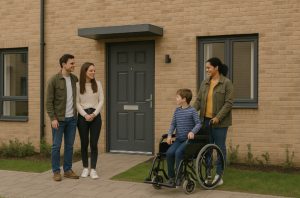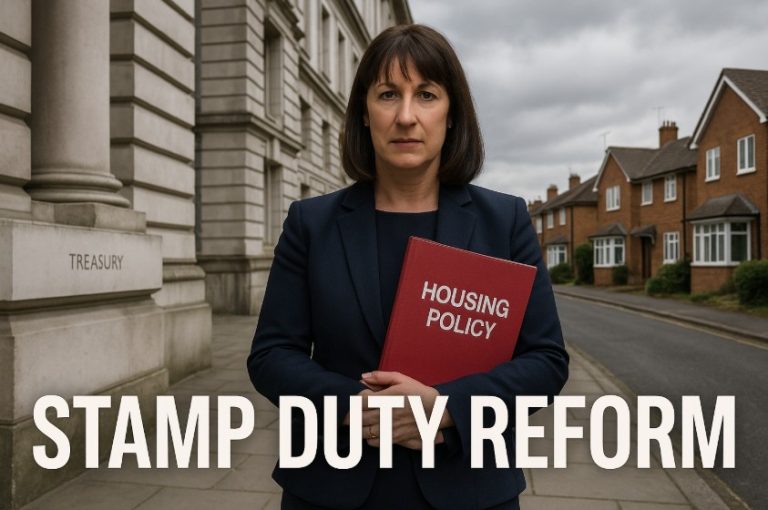Shared ownership offers a pathway to homeownership for those who may not have the means to purchase a property outright. However, questions often arise around flexibility, particularly, can you rent out a shared ownership property in the UK? The answer depends on a variety of factors, including the type of rental arrangement, your lease agreement, and the housing association’s policies.
This article explores the rules, legal implications, and practical considerations for anyone thinking of renting out a shared ownership home.
What Is a Shared Ownership Property and How Does It Work?

Shared ownership is a scheme primarily designed to assist people who cannot afford to buy a home outright.
This government-backed programme allows individuals to purchase a percentage of a property, typically from 10% to 75%, while paying rent on the remaining portion owned by a housing association or other registered provider.
The property is always leasehold, which means the buyer owns a lease that gives them the right to live in the property for a fixed period, often 99 or 125 years. The housing provider retains ownership of the unsold share and is the landlord.
In practice, this means:
- The buyer pays a mortgage on their share
- Rent is paid monthly on the share retained by the provider
- The buyer also pays service charges and ground rent, where applicable
This arrangement makes home ownership more accessible, especially for first-time buyers and individuals with moderate incomes.
What Are the Benefits of Owning a Shared Ownership Property?
Shared ownership offers several notable benefits. One of the primary advantages is the ability to get onto the property ladder with a lower financial barrier.
Since only a portion of the property is being purchased, the deposit required is smaller compared to buying outright.
Other advantages include:
- Opportunity to gradually purchase more of the property through staircasing, potentially up to full ownership
- Reduced monthly costs compared to renting privately or owning 100% of a property with a mortgage
- Increased housing stability since you’re not subject to a private landlord’s discretion
Additionally, shared ownership properties can be sold at any time. The resale process is often managed through the housing provider, who may have a first right to market the property or nominate a new buyer.
Who Is Eligible for a Shared Ownership Property in the UK?

Eligibility criteria are established to ensure the scheme benefits those who need it most. The general requirements for purchasing a shared ownership home include:
- A household income not exceeding £80,000 per annum, or £90,000 if the property is in London
- Inability to afford a suitable home on the open market
Applicants must also fall into at least one of the following categories:
- First-time buyers
- Former homeowners who are unable to afford a property now
- Individuals forming a new household, such as after a separation
- Existing shared ownership residents wishing to move
Special provisions are available for people over 55 and individuals with long-term disabilities. The Older Persons Shared Ownership scheme limits the maximum share to 75%, after which no rent is charged. Meanwhile, the HOLD scheme caters to disabled buyers whose housing needs aren’t met through standard properties.
Can You Rent Out a Room in a Shared Ownership Property?
Renting out a spare room, also known as taking in a lodger, is generally permitted under shared ownership. This is because the leaseholder still resides in the home, and the arrangement does not constitute full subletting.
However, before proceeding, it is advisable to check:
- The terms of your lease, especially if any clauses restrict lodging arrangements
- Whether the housing association requires notification, even if permission is not formally needed
While most landlords do not object to lodgers, some may include restrictions to protect the integrity of the property or maintain the residential nature of the scheme.
Some considerations include:
- Lodgers do not have tenancy rights, which simplifies the legal process
- Income from lodgers may be subject to tax, although the Rent-a-Room scheme allows up to £7,500 tax-free annually
Can You Sublet the Entire Shared Ownership Property?
Full subletting is significantly more complex. Generally, shared ownership leases prohibit subletting unless the leaseholder owns 100% of the property or receives explicit permission from the housing association. This restriction ensures that the home remains occupied by those the scheme was designed to help.
Subletting may be allowed under exceptional circumstances, such as:
- Deployment abroad for military service
- Temporary job relocation
- Medical reasons or family care obligations
Housing associations typically consider these on a case-by-case basis. If subletting is permitted, the owner is still bound by the lease and must ensure compliance with its terms.
What Are the Legal and Lease Considerations Before Renting?

Before deciding to rent out a shared ownership property, it is vital to understand the legal framework and lease obligations that govern such actions.
Shared ownership arrangements are governed by strict legal terms designed to ensure the property serves its intended purpose: helping eligible individuals access affordable homeownership.
Renting, particularly subletting, without understanding these legal implications can lead to significant consequences, including breach of contract or legal action by the housing provider.
Lease Agreement Restrictions
The lease is the principal legal document in a shared ownership arrangement and outlines the rights, responsibilities, and limitations of the leaseholder.
Most shared ownership leases explicitly prohibit subletting the entire property unless the owner has staircased to 100% ownership. This is because the shared ownership model is intended for owner-occupiers rather than private landlords.
Common lease clauses that restrict renting include:
- A prohibition on assigning or underletting the lease without the landlord’s written consent
- A clause requiring the property to be used as the leaseholder’s main and only residence
- Terms stating that the property cannot be used for commercial or rental purposes
Attempting to rent out the property without adherence to these clauses constitutes a breach of lease, which can result in enforcement action, legal proceedings, or even forfeiture of the leasehold interest.
Importance of the Key Information Document
The Key Information Document (KID) provided at the time of purchase summarises important aspects of the lease in accessible language. It often includes:
- Restrictions on renting or subletting
- Requirements for seeking landlord approval
- Guidance on fees and administrative processes associated with requesting permission
This document is a useful reference for leaseholders exploring the idea of renting, as it outlines the expected processes and limitations specific to the property.
Role of the Housing Association
The housing association or registered provider acts as both landlord and lease administrator. They are responsible for enforcing lease terms and ensuring the property is used appropriately under the shared ownership scheme.
If a leaseholder wishes to sublet, even temporarily, written consent must be obtained from the housing association unless the lease explicitly allows subletting under specific circumstances.
The association may require:
- A full explanation of why the leaseholder is seeking to sublet
- Information about the proposed tenant, including references
- A copy of the draft tenancy agreement
- Contact details of any letting agent managing the property
This process is necessary for compliance, as housing associations are not obliged to grant permission and assess requests on a case-by-case basis.
Mortgage Provider’s Terms and Conditions
In addition to the housing association, mortgage lenders may impose their own conditions concerning renting or subletting. Many residential mortgage agreements prohibit letting the property without prior written consent from the lender, and breaching these terms can trigger default clauses or penalties.
Leaseholders should consult their mortgage agreement and inform their lender of any intent to rent out the property. If the lender permits it, they may require:
- Consent to Let documentation
- A change to a Buy-to-Let mortgage product, depending on the length and nature of the tenancy
Failure to comply with the lender’s conditions can result in serious financial and legal repercussions, including the risk of foreclosure.
Insurance Considerations
Standard home insurance policies often do not cover rental activities, leaving leaseholders financially exposed in the event of a claim. Before renting out any part of the shared ownership property, it is crucial to update the insurance policy to a landlord-specific cover, which typically includes:
- Public liability protection
- Loss of rent coverage
- Legal expenses insurance
Housing associations may also require evidence of adequate insurance before approving any rental arrangement.
Legal Liability as a Landlord
Once a leaseholder rents out part or all of their property, they assume the legal role of a landlord, even within a shared ownership context. This brings additional legal duties and obligations, including:
- Gas Safety Regulations 1998: Annual inspection and certification by a registered engineer
- Electrical Safety Standards: Mandatory inspections every five years by a qualified electrician
- Fire Safety: Provision of working smoke alarms and carbon monoxide detectors
- Right to Rent Checks: Verification of tenants’ immigration status, as required under the Immigration Act 2014
Non-compliance with any of these legal obligations can result in fines, legal action, or prohibition from renting in the future.
What Is the Process for Getting Permission to Rent Out?

If a leaseholder intends to sublet the entire home, the process involves multiple steps and formal approval. Housing associations assess each request based on the merits and context provided.
Steps in the process include:
- Submit a formal written request explaining the reason for subletting
- Provide supporting documents including:
- Details of the proposed tenant
- Tenancy agreement for review
- Letting agency information, if relevant
- Await written consent from the housing provider before proceeding
Landlords usually retain full discretion and may refuse permission if the request doesn’t meet their criteria. Even when approval is granted, leaseholders remain responsible for:
- Ensuring the tenant abides by lease conditions
- Paying rent, service charges, and ground rent
- Maintaining the property
What Are the Risks and Responsibilities When Renting a Shared Ownership Property?
Taking on the role of a landlord comes with obligations. Even in permitted situations, the leaseholder must remain compliant with both legal and lease requirements.
Some of the key responsibilities include:
- Safety compliance, such as gas and electrical safety checks
- Ongoing repairs and maintenance
- Ensuring the tenancy agreement adheres to the Housing Act 1988
From a financial perspective, there may be additional costs:
- Specialist landlord insurance may be required
- Letting agent fees if third-party services are used
- Income tax on rental earnings
The table below compares the key responsibilities between living in the property versus renting it out:
| Responsibility | While Occupying the Property | While Renting the Property |
| Property Maintenance | Shared with housing provider | Leaseholder’s full duty |
| Legal Compliance | Minimal | Full landlord obligations |
| Insurance | Standard home insurance | Landlord insurance |
| Tenant Management | Not applicable | Required |
Understanding these risks is crucial. Non-compliance can result in significant repercussions, including financial penalties and legal disputes. It may also impact your eligibility for future housing association schemes.
Should You Sell Instead of Renting Out a Shared Ownership Property?

When subletting is not possible or practical, selling the shared ownership home may be a better alternative. Housing associations generally offer a process for reselling, often requiring the seller to give them the opportunity to find a buyer first, typically within an eight-week nomination period.
Comparing renting and selling can help in making an informed decision:
| Criteria | Renting Out | Selling Your Share |
| Permission Required | Yes (unless 100% ownership) | Not required, but notify provider |
| Ongoing Responsibilities | Full landlord duties | Ends after sale |
| Legal and Tax Implications | Rental income, landlord obligations | Potential capital gains tax |
| Time and Cost Considerations | Ongoing effort and costs | Upfront legal and marketing fees |
For some, the ongoing responsibilities of renting may outweigh the short-term financial benefits. Selling, especially after staircasing to a higher ownership percentage, may offer a simpler exit route and financial return.
Conclusion
In short, you can rent out a shared ownership property in some situations, but it heavily depends on your lease terms, your percentage of ownership, and your housing association’s policies.
- Taking in a lodger while living in the property is usually allowed.
- Subletting the entire property typically requires 100% ownership or exceptional approval.
- Permissions and legal responsibilities are critical before proceeding with any rental arrangement.
Those considering rental options are advised to review their lease, consult their housing association, and seek professional legal or tax advice where necessary.
FAQs About Renting Shared Ownership Properties
Can I take in a lodger without permission in a shared ownership home?
In most cases, yes. As long as you continue to live in the home, housing associations usually allow lodgers without formal permission, but always check your lease.
What happens if I rent out my shared ownership home without consent?
Renting without consent can be a breach of lease terms. This can result in penalties, loss of your lease, or even legal proceedings.
Do I need landlord insurance to rent out a shared ownership property?
Yes, if you rent the property, standard homeowner’s insurance won’t suffice. You’ll need landlord insurance to cover liabilities and property risks.
How does subletting affect my shared ownership mortgage?
Subletting without lender approval could violate your mortgage terms. Always consult your lender before proceeding.
Can I rent out a shared ownership property temporarily while working abroad?
Possibly. Some housing associations allow temporary subletting for work commitments, but it must be approved in writing and is not guaranteed.
Is there a tax implication when renting out a shared ownership property?
Yes. Any rental income must be declared to HMRC. You may also be liable for capital gains tax if you staircase and later sell at a profit.
Who pays service charges when the property is rented out?
The legal owner (you) remains responsible for all service charges and ground rent, regardless of whether the property is rented out.






